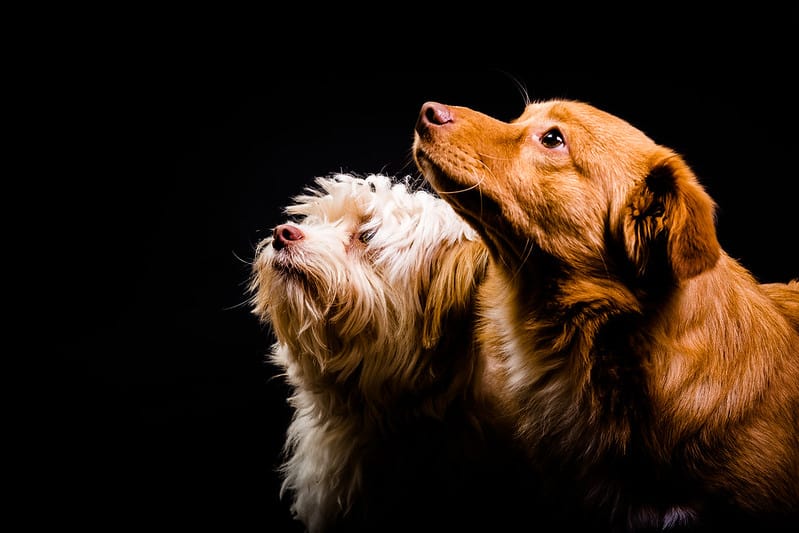You can recognize many illnesses through your dog’s body language, most of them are physical, but anxiety is, in fact, a mental illness. So, how do you know if your dog has anxiety?
Sometimes we can see our dog very nervous and restless, manifesting a lot of stress. The mind can play a bad trick on them because dogs also have memories or traumas from situations they have suffered.
Dog’s anxiety is more frequent than you think and is quite similar to humans. It is a harmful emotional state that affects dogs’ behavior in situations such as loud noises and feelings of loneliness or abandonment.
Almost all dogs suffering from anxiety try to suppress or reduce it as much as possible.
If your dog constantly suffers from this problem, you will notice symptoms such as nervousness, agitation, and bad behavior. Those symptoms can affect the relationship between you and your dog.
What Causes Dog Anxiety?
1-Bad Or Late Puppy Socialization
Socialization is when dogs in their puppy stage (from birth to 3 or 4 months) learn to live with other animals and people and know their environment.
It develops the basis of their character and personality for their future.
If a dog does not go through this crucial learning stage, it will likely suffer from behavioral problems and anxiety when it is older.
Related blog: Puppy Socialization Stage.
2-Separation Anxiety
Dogs are naturally sociable animals that live in packs. When puppies grow up, they become more independent and develop more tolerance for separation.
However, being separated from their mother and siblings before 8 weeks of age or being abandoned is more likely to affect their personality and mental health.
It can make the dogs prone to panic or anxiety attacks and cannot tolerate separation from their owners because they feel totally unprotected.
3-Traumatic Experience
If your dog had a traumatic experience, it might develop anxiety attacks. A physical injury or a fright while being left alone when it was just a puppy are typical experiences.
4-Phobias
Phobia is already a disorder that, by itself, must be treated. It is when a dog has very intense and exaggerated fears.
I have a ten-year-old Shih Tzu. He gets very anxious with loud noises like fireworks or even the oven fan, and he starts drooling and trembling.
Phobias can also be about inanimate objects like a vacuum cleaner, a car, or other situations that can cause your dog to have a sudden nervous breakdown.
5-Dementia In Senior Dogs
Elderly or senior dogs often have dog dementia, also known as Canine Cognitive Dysfunction (CCD), a disease that appears earlier in larger breed dogs.
The symptoms are usually anxiety, getting lost in familiar places, irritability, phobia, confusion, depression.
But you can do your part to help your four-legged friend.
Older dogs can also appreciate a good toy, a routine walk, a new bed, a healthy diet, etc.
Dog dementia can be treated. Check with your vet to get professional advice on what you would need for your dog’s particular case.
Is Your Dog Prone To Anxiety?
It is unknown whether a dog’s hereditary factors can affect it and cause this type of disorder.
Sometimes behavioral problems in dogs can be genetic, so it is worth finding out a little about your dog’s parents if they have had this type of problem.
Separation anxiety is not unique to a specific breed, but it is more common in some breeds than others.
Breeds known to be “gun dogs” or “people-dogs” seem to be more at risk than others, as they tend to spend more time with their families.
Breeds such as Labrador Retrievers, Cocker Spaniels, Bichon Frises, Toy Poodles, German Shepherds, or Border Collies tend to develop anxiety more than others.
How To Treat A Dog With Anxiety?
It is important to identify the symptoms your dog suffers from.
Treating it will take time, but with patience and a lot of affection, you reduce your dog’s anxiety by following these steps:
- Create habits for your dog: Establish schedules for daily walks, for food, for playtime, etc. Dogs need to have routines as this makes them feel calm. They know what to expect, and they will not be overwhelmed with change and uncertainty.
- Don’t leave your dog alone for too long: If your dog suffers from separation anxiety and you have to leave it alone all day, you can set up a daily schedule of outings
• Ask someone you trust to help you walk your dog. Remember that your dog needs physical activities daily.
• Leave toys around the house that allow it to entertain itself and drain all its energy while you are away. - Don’t punish it: punishing your dog while going through a crisis can only make things worse. Your dog doesn’t know what it is feeling or what it is doing wrong.
• Try to calm it down by using a calm voice.
• Don’t coddle it too much, or it may get confused and think it has the right attitude.
If your dog sees that everyone in its pack is calm, it may feel that there is no need to be alert. - Use positive reinforcement: Reward your dog with treats and affection when it faces these kinds of situations in the right way. It will know it is doing well and can relax a little.
Products To Help Calming Your Dog
Some treatments and products provide your dog with calm and security in these types of situations and keep its mind occupied with other matters by reducing its stress levels:
- Dog Anxiety Vests or Jackets: Anxiety Vests for dogs are garments that have an immediate calming effect by exerting gentle and constant pressure on the dog’s torso; this produces a calming effect just like a constant hug.
It will make your dog feel more secure, reduce its stress, and make effects such as loud noises, thunder, or fireworks feel less noticeable. - Dog Anxiety Beds: these beds help your dog relax and rest better. They have raised edges that create a sense of security and maintain the perfect temperature, making your puppy relax faster and get a deeper rest.
It’s ideal if your dog spends too much time alone in the house. - Dog Anxiety Toys: Experts agree that one of the best ways to help your dog cope with separation anxiety is keeping him busy with toys.
- Dog Anxiety Treats: like nutritional supplements for humans, these calming chews, or calming bites as they are called, are a great non-medicinal anxiety-treating remedy you can offer your dog help ease the symptoms.
Music, please
According to Science Direct, a well-trusted science research company:
- Classical music reduces stress in dogs.
- Dogs are more relaxed when listening to music.
- Soft rock and reggae are the go-to types of music for stress relief in dogs.
Home Remedies That Can Calm Your Dog
- Lavender: The aroma of lavender is scientifically proven to have calming effects. You can place some lavender near its rest area or where your dog can smell it.
- Oats: It is an excellent relaxing tonic; you can give your dog a small portion of cooked or raw oats for 15 days.
- Valerian: Calms and helps your dog sleep well by reducing stress. Add 3 drops of valerian to your dog’s food.
Always Consult Your Veterinarian
Although I have given you an exhaustive list of remedies and products to help with your dog’s anxiety, this kind of problem is sometimes very strong, and it may need medication.
Your vet will deal with the symptoms and behavioral disturbances and give you advice specific to your dog’s case. Animal psychologists or even your dog trainer can help too.
In the end, make sure to provide for your dog’s general well-being by covering its basic needs, like good nutrition, physical exercise, daily socialization, and regular visits to the vet.
It is important to eliminate the stimulus caused by your dog’s anxiety.
And remember, it’s a little difficult for your furry friend to overcome its fears, so be patient and loving. With these tips and resources, your dog will be more confident and secure in exploring its surroundings.
Recent Posts
As a dog owner, you want to ensure that you take proper care of your furry companion. A common question that many pet owners have is, "Can I walk my dog 30 minutes after eating?" Understanding the...
Have you ever considered getting an elevated dog bed for your furry friend, but wondered if it's worth the investment? If so, you're not alone. As dog owners, we all want to provide the best care for...




